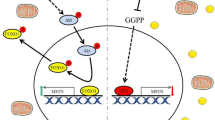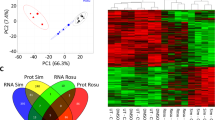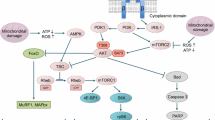Abstract
Statins inhibit cholesterol biosynthesis and lower serum LDL-cholesterol levels. Statins are generally well tolerated, but can be associated with potentially life-threatening myopathy of unknown mechanism. We have shown previously that statins impair PGC-1β expression in human and rat skeletal muscle, suggesting that PGC-1β may play a role in statin-induced myopathy. PGC-1β is a transcriptional co-regulator controlling the expression of important genes in mitochondrial biogenesis, antioxidative capacity and energy metabolism. The principle aim of the current study was to investigate the interaction between atorvastatin and PGC-1β in more detail. We therefore treated wild-type mice and mice with selective skeletal muscle knockout of PGC-1β (PGC-1β(i)skm−/− mice) with oral atorvastatin (5 mg/kg/day) for 2 weeks. At the end of treatment, we determined body parameters, muscle function, structure, and composition as well as the function of muscle mitochondria, mitochondrial biogenesis and activation of apoptotic pathways. In wild-type mice, atorvastatin selectively impaired mitochondrial function in glycolytic muscle and caused a conversion of oxidative type IIA to glycolytic type IIB myofibers. Conversely, in oxidative muscle of wild-type mice, atorvastatin enhanced mitochondrial function via activation of mitochondrial biogenesis pathways and decreased apoptosis. In PGC-1β(i)skm−/− mice, atorvastatin induced a switch towards glycolytic fibers, caused mitochondrial dysfunction, increased mitochondrial ROS production, impaired mitochondrial proliferation and induced apoptosis in both glycolytic and oxidative skeletal muscle. Our work reveals that atorvastatin mainly affects glycolytic muscle in wild-type mice and demonstrates the importance of PGC-1β for oxidative muscle integrity during long-term exposure to a myotoxic agent.








Similar content being viewed by others
Abbreviations
- CK:
-
Creatine kinase
- FRL:
-
Free radical leak
- HMG-CoA:
-
3-Hydroxy-3-methylglutaryl-coenzyme A
- MHC:
-
Myosin heavy chain
- mtDNA:
-
Mitochondrial DNA
- NADH:
-
Nicotinamide adenine dinucleotide (reduced)
- OXPHOS:
-
Oxidative phosphorylation
- PGC:
-
Peroxisome proliferator-activated receptor-γ co-activator
- ROS:
-
Reactive oxygen species
References
Alfirevic A, Neely D, Armitage J et al (2014) Phenotype standardization for statin-induced myotoxicity. Clin Pharmacol Ther 96:470–476. https://doi.org/10.1038/clpt.2014.121
Anderson EJ, Neufer PD (2006) Type II skeletal myofibers possess unique properties that potentiate mitochondrial H(2)O(2) generation. Am J Physiol Cell Physiol 290:C844–C851. https://doi.org/10.1152/ajpcell.00402.2005
Arany Z, Lebrasseur N, Morris C et al (2007) The transcriptional coactivator PGC-1Beta drives the formation of oxidative type IIX fibers in skeletal muscle. Cell Metab 5:35–46. https://doi.org/10.1016/j.cmet.2006.12.003
Banach M, Serban C, Sahebkar A et al (2015) Effects of coenzyme Q10 on statin-induced myopathy: a meta-analysis of randomized controlled trials. Mayo Clin Proc 90:24–34. https://doi.org/10.1016/j.mayocp.2014.08.021
Björkhem-Bergman L, Lindh JD, Bergman P (2011) What is a relevant statin concentration in cell experiments claiming pleiotropic effects? Br J Clin Pharmacol 72:164–165. https://doi.org/10.1111/j.1365-2125.2011.03907.x
Bloemberg D, Quadrilatero J (2012) Rapid determination of myosin heavy chain expression in rat, mouse, and human skeletal muscle using multicolor immunofluorescence analysis. PLoS One 7:. https://doi.org/10.1371/journal.pone.0035273
Bonifacio A, Sanvee GM, Bouitbir J, Krähenbühl S (2015) The AKT/mTOR signaling pathway plays a key role in statin-induced myotoxicity. Biochim Biophys Acta Mol Cell Res 1853:1841–1849. https://doi.org/10.1016/j.bbamcr.2015.04.010
Bonifacio A, Mullen PJ, Mityko IS et al (2016) Simvastatin induces mitochondrial dysfunction and increased atrogin-1 expression in H9c2 cardiomyocytes and mice in vivo. Arch Toxicol 90:203–215. https://doi.org/10.1007/s00204-014-1378-4
Bouitbir J, Charles AL, Echaniz-Laguna A et al (2012) Opposite effects of statins on mitochondria of cardiac and skeletal muscles: a “mitohormesis” mechanism involving reactive oxygen species and PGC-1. Eur Heart J 33:1397–1407. https://doi.org/10.1093/eurheartj/ehr224
Bouitbir J, Singh F, Charles A-L et al (2016) Statins trigger mitochondrial reactive oxygen species-induced apoptosis in glycolytic skeletal muscle. Antioxid Redox Signal 24:84–98. https://doi.org/10.1089/ars.2014.6190
Brault JJ, Jespersen JG, Goldberg AL (2010) Peroxisome proliferator-activated receptor gamma coactivator 1alpha or 1beta overexpression inhibits muscle protein degradation, induction of ubiquitin ligases, and disuse atrophy. J Biol Chem 285:19460–19471. https://doi.org/10.1074/jbc.M110.113092
Chang JH, Ly J, Plise E et al (2014) Differential effects of rifampin and ketoconazole on the blood and liver concentration of atorvastatin in wild-type and Cyp3a and Oatp1a/b knockout mice. Drug Metab Dispos 42:1067–1073. https://doi.org/10.1124/dmd.114.057968
Cholesterol Treatment Trialists’ (CTT) Collaboration, Baigent C, Blackwell L et al (2010) Efficacy and safety of more intensive lowering of LDL cholesterol: a meta-analysis of data from 170,000 participants in 26 randomised trials. Lancet 376:1670–1681. https://doi.org/10.1016/S0140-6736(10)61350-5
Cholesterol Treatment Trialists’ (CTT) Collaborators, Mihaylova B, Emberson J et al (2012) The effects of lowering LDL cholesterol with statin therapy in people at low risk of vascular disease: meta-analysis of individual data from 27 randomised trials. Lancet 380:581–590. https://doi.org/10.1016/S0140-6736(12)60367-5
Correia JC, Ferreira DMS, Ruas JL (2015) Intercellular: local and systemic actions of skeletal muscle PGC-1 s. Trends Endocrinol Metab. https://doi.org/10.1016/j.tem.2015.03.010
de Chaumont F, Dallongeville S, Chenouard N et al (2012) Icy: an open bioimage informatics platform for extended reproducible research. Nat Methods 9:690–696. https://doi.org/10.1038/nmeth.2075
Gali Ramamoorthy T, Laverny G, Schlagowski A-I et al (2015) The transcriptional coregulator PGC-1β controls mitochondrial function and anti-oxidant defence in skeletal muscles. Nat Commun 6:10210. https://doi.org/10.1038/ncomms10210
Gariani K, Menzies KJ, Ryu D et al (2015) Eliciting the mitochondrial unfolded protein response via NAD + repletion reverses fatty liver disease. Hepatology. https://doi.org/10.1002/hep.28245
Gnaiger E (2009) Capacity of oxidative phosphorylation in human skeletal muscle: new perspectives of mitochondrial physiology. Int J Biochem Cell Biol 41:1837–1845. https://doi.org/10.1016/j.biocel.2009.03.013
Hanai JI, Cao P, Tanksale P et al (2007) The muscle-specific ubiquitin ligase atrogin-1/MAFbx mediates statin-induced muscle toxicity. J Clin Investig 117:3940–3951. https://doi.org/10.1172/JCI32741
Handschin C, Spiegelman BM (2011) PGC-1 coactivators and the regulation of skeletal muscle fiber-type determination. Cell Metab 13:351. https://doi.org/10.1016/j.cmet.2011.03.008
Handschin C, Chin S, Li P et al (2007) Skeletal muscle fiber-type switching, exercise intolerance, and myopathy in PGC-1 muscle-specific knock-out animals. J Biol Chem 282:30014–30021. https://doi.org/10.1074/jbc.M704817200
Higgins JW, Bao JQ, Ke AB et al (2014) Utility of Oatp1a/1b-knockout and OATP1B1/3-humanized mice in the study of OATP-mediated pharmacokinetics and tissue distribution: case studies with pravastatin, atorvastatin, simvastatin, and carboxydichlorofluorescein. Drug Metab Dispos 42:182–192. https://doi.org/10.1124/dmd.113.054783
Krähenbühl S, Pavik-Mezzour I, von Eckardstein A (2016) Unmet needs in LDL-C lowering: when statins won’t do! Drugs 76:1175–1190. https://doi.org/10.1007/s40265-016-0613-0
Kwak H-B, Thalacker-Mercer A, Anderson EJ et al (2012) Simvastatin impairs ADP-stimulated respiration and increases mitochondrial oxidative stress in primary human skeletal myotubes. Free Radic Biol Med 52:198–207. https://doi.org/10.1016/j.freeradbiomed.2011.10.449
Larsen S, Stride N, Hey-Mogensen M et al (2013) Simvastatin effects on skeletal muscle: relation to decreased mitochondrial function and glucose intolerance. J Am Coll Cardiol 61:44–53. https://doi.org/10.1016/j.jacc.2012.09.036
Law MR, Wald NJ, Rudnicka AR (2003) Quantifying effect of statins on low density lipoprotein cholesterol, ischaemic heart disease, and stroke: systematic review and meta-analysis. BMJ 326:1423. https://doi.org/10.1136/bmj.326.7404.1423
Liang H, Ward WF (2006) PGC-1alpha: a key regulator of energy metabolism. Adv Physiol Educ 30:145–151. https://doi.org/10.1152/advan.00052.2006
Lin J, Puigserver P, Donovan J et al (2002a) Peroxisome proliferator-activated receptor gamma coactivator 1beta (PGC-1beta), a novel PGC-1-related transcription coactivator associated with host cell factor. J Biol Chem 277:1645–1648. https://doi.org/10.1074/jbc.C100631200
Lin J, Wu H, Tarr PT et al (2002b) Transcriptional co-activator PGC-1 alpha drives the formation of slow-twitch muscle fibres. Nature 418:797–801. https://doi.org/10.1038/nature00904
Ling C, Poulsen P, Carlsson E et al (2004) Multiple environmental and genetic factors influence skeletal muscle PGC-1α and PGC-1β gene expression in twins. J Clin Investig 114:1518–1526. https://doi.org/10.1172/JCI21889
Liu W, Saint DA (2002) A new quantitative method of real time reverse transcription polymerase chain reaction assay based on simulation of polymerase chain reaction kinetics. Anal Biochem 302:52–59. https://doi.org/10.1006/abio.2001.5530
Ljubicic V, Joseph A-M, Saleem A et al (2010) Transcriptional and post-transcriptional regulation of mitochondrial biogenesis in skeletal muscle: effects of exercise and aging. Biochim Biophys Acta 1800:223–234. https://doi.org/10.1016/j.bbagen.2009.07.031
McKenney JM (2003) Pharmacologic characteristics of statins. Clin Cardiol 26:32–38. https://doi.org/10.1002/clc.4960261507
Meng Z-X, Li S, Wang L et al (2013) Baf60c drives glycolytic metabolism in the muscle and improves systemic glucose homeostasis through Deptor-mediated Akt activation. Nat Med 19:640–645. https://doi.org/10.1038/nm.3144
Puigserver P, Spiegelman BM (2003) Peroxisome proliferator-activated receptor-gamma coactivator 1 alpha (PGC-1 alpha): transcriptional coactivator and metabolic regulator. Endocr Rev 24:78–90
Ramakers C, Ruijter JM, Deprez RH, Moorman AF (2003) Assumption-free analysis of quantitative real-time polymerase chain reaction (PCR) data. Neurosci Lett 339:62–66
Reagan-Shaw S, Nihal M, Ahmad N (2008) Dose translation from animal to human studies revisited. FASEB J 22:659–661. https://doi.org/10.1096/fj.07-9574LSF
Röckl KSC, Hirshman MF, Brandauer J et al (2007) Skeletal muscle adaptation to exercise training. Diabetes 56:2062–2069. https://doi.org/10.2337/db07-0255
RStudio Team (2016) RStudio: Integrated development environment for R. RStudio, Inc., Boston, MA. http://www.rstudio.com/
Rowe G, Patten I, Zsengeller ZK et al (2013) Disconnecting mitochondrial content from respiratory chain capacity in PGC-1-deficient skeletal muscle. Cell Rep 3:1449–1456. https://doi.org/10.1016/j.celrep.2013.04.023
Schick B, Laaksonen R, Frohlich JJ et al (2007) Decreased skeletal muscle mitochondrial DNA in patients treated with high-dose simvastatin. Clin Pharmacol Ther 81:650–653. https://doi.org/10.1038/sj.clpt.6100124
Schirris TJJ, Renkema GH, Ritschel T et al (2015) Statin-induced myopathy is associated with mitochondrial complex III inhibition. Cell Metab 22:399–407. https://doi.org/10.1016/j.cmet.2015.08.002
Seachrist JL, Loi C-M, Evans MG et al (2005) Roles of exercise and pharmacokinetics in cerivastatin-induced skeletal muscle toxicity. Toxicol Sci 88:551–561. https://doi.org/10.1093/toxsci/kfi305
Singh F, Charles A-L, Schlagowski A-I et al (2015) Reductive stress impairs myoblasts mitochondrial function and triggers mitochondrial hormesis. Biochim Biophys Acta Mol Cell Res 1853:1574–1585. https://doi.org/10.1016/j.bbamcr.2015.03.006
Stringer H, Sohi J, Maguire GK, Côté J HCF (2013) Decreased skeletal muscle mitochondrial DNA in patients with statin-induced myopathy. J Neurol Sci 325:142–147. https://doi.org/10.1016/j.jns.2012.12.023
Thompson PD, Panza G, Zaleski A, Taylor B (2016) Statin-associated side effects. J Am Coll Cardiol 67:2395–2410. https://doi.org/10.1016/j.jacc.2016.02.071
Veksler VI, Kuznetsov AV, Sharov VG et al (1987) Mitochondrial respiratory parameters in cardiac tissue: a novel method of assessment by using saponin-skinned fibers. Biochim Biophys Acta 892:191–196
Vianna CR, Huntgeburth M, Coppari R et al (2006) Hypomorphic mutation of PGC-1beta causes mitochondrial dysfunction and liver insulin resistance. Cell Metab 4:453–464. https://doi.org/10.1016/j.cmet.2006.11.003
Walker DB, Jacobson TA (2008) Initiating statins in the elderly: the evolving challenge. Curr Opin Endocrinol Diabetes Obes 15:182–187. https://doi.org/10.1097/MED.0b013e3282f7cd6d
Westwood FR, Bigley A, Randall K et al (2005) Statin-induced muscle necrosis in the rat: distribution, development, and fibre selectivity. Toxicol Pathol 33:246–257. https://doi.org/10.1080/01926230590908213
Zechner C, Lai L, Zechner JF et al (2010) Total skeletal muscle PGC-1 deficiency uncouples mitochondrial derangements from fiber type determination and insulin sensitivity. Cell Metab 12:633–642. https://doi.org/10.1016/j.cmet.2010.11.008
Acknowledgements
We thank the staff of the mouse facilities from Institut de Génétique et de Biologie Moléculaire et Cellulaire and Institut Clinique de la Souris from Illkirch in France. This work was supported by funds from the Centre National de la Recherche Scientifique, the Institut National de la Santé et de la Recherche Médicale, the Collège de France, the Université de Strasbourg, the Agence Nationale de la Recherche (05-PCOD-032) and by French state funds through the Agence Nationale de la Recherche ANR-10-LABX-0030-INRT under the frame programme Investissements d’Avenir labelled ANR-10-IDEX-0002-02. G.L. was supported by the Agence Nationale de la Recherche (2010BLAN1108-01). SK was supported by a grant of the Swiss National Science Foundation (31003A_156270).
Author information
Authors and Affiliations
Contributions
FS, JZ, DM, BG, SK and BJ conceived and designed study, and FS, UD, ALC, MP, GL, and BJ performed experiments and analyzed data. FS, DM, TMW, BG, SK, and JB wrote the manuscript.
Corresponding author
Ethics declarations
Ethical standards
Ethical approval: All applicable international, national, and/or institutional guidelines for the care and use of animals were followed. All animal experiments were approved by the Ethics Committee Com’Eth (Comité d’Ethique pour l’Expérimentation Animale, Strasbourg, France), and have therefore been performed in accordance with the ethical standards laid down in the 1964 Declaration of Helsinki and its later amendments.
Conflict of interest
The authors declare that they have no conflict of interest.
Electronic supplementary material
Below is the link to the electronic supplementary material.
Rights and permissions
About this article
Cite this article
Singh, F., Zoll, J., Duthaler, U. et al. PGC-1β modulates statin-associated myotoxicity in mice. Arch Toxicol 93, 487–504 (2019). https://doi.org/10.1007/s00204-018-2369-7
Received:
Accepted:
Published:
Issue Date:
DOI: https://doi.org/10.1007/s00204-018-2369-7




